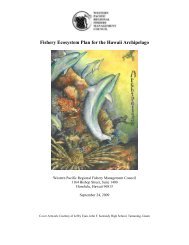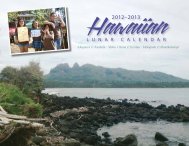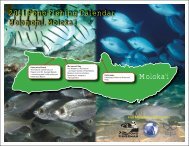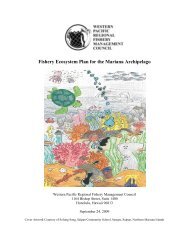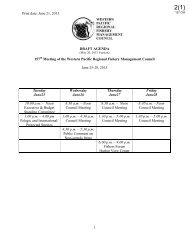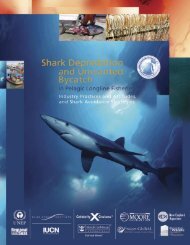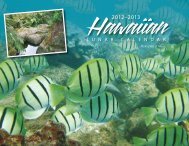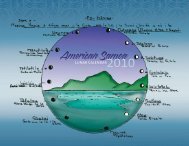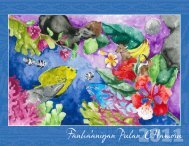PROCEEDINGS OF THE FOuRTH INTERNaTIONal FISHERS FORum
PROCEEDINGS OF THE FOuRTH INTERNaTIONal FISHERS FORum
PROCEEDINGS OF THE FOuRTH INTERNaTIONal FISHERS FORum
You also want an ePaper? Increase the reach of your titles
YUMPU automatically turns print PDFs into web optimized ePapers that Google loves.
[ 6.3. ]<br />
IFF3 Commitments and Progress<br />
Ms. Kitty Simonds, Executive Director, Western Pacific Regional Fishery Management Council<br />
Over the past seven years, the International Fishers Forum<br />
(IFF) series has brought together a diverse group of<br />
fishermen and other interested persons who are united in<br />
the belief that conserving our fisheries and protecting our<br />
ocean environment are not mutually exclusive goals.<br />
This week, at IFF4, we will continue our work to develop<br />
environmentally responsible fisheries. As in previous<br />
Forums, we will examine the impacts of our fisheries with<br />
a critical eye and open mind. We will generously share our<br />
best practices and expert knowledge. And we will commit<br />
ourselves as individuals and groups to actions that will<br />
ensure that we have not only fish forever but also healthy<br />
populations of seabirds, sea turtles and marine mammals.<br />
Before we begin this task, let us take a few minutes to review<br />
the outcomes of the previous IFF gatherings and the major<br />
movements that have occurred since IFF3. This review<br />
should benefit the approximately 60 participants who are<br />
new to this Forum. It should also help remind all of us to<br />
listen attentively to the presentations in order to glean from<br />
them the next steps that we need to take and the actions that<br />
we as individuals or group will commit to.<br />
When the first IFF gathering was held in New Zealand in the<br />
year 2000, our initial concern was mitigating interactions<br />
between pelagic longline fisheries and seabirds. The<br />
participants, coming from 13 countries, acknowledged that<br />
an integrated “bottom-up” fishery-specific and area-specific<br />
approach was required. They recognized the need for ongoing<br />
research and development and acknowledged that progress<br />
would be determined by their own contribution within<br />
their own fishing entities, regions or organizations. They<br />
recognized that differences of expertise and economy would<br />
in part determine the objectives that each entity could set.<br />
When the Forum reconvened in Hawaii in 2002, the theme<br />
was expanded to include interactions between pelagic<br />
longline fisheries and sea turtles as well as seabirds. The<br />
participants drafted a Forum Resolution, which contained<br />
actions to promote involvement in the IFF initiatives by<br />
the United Nation’s Food and Agriculture Organization<br />
(FAO), the Convention on Migratory Species, relevant<br />
regional fisheries management organizations (RFMOs)<br />
and national agencies. In addition to this Resolution, there<br />
were commitments to specific concrete actions from 65<br />
individuals and groups.<br />
In 2005, IFF3 convened in Japan jointly with the<br />
International Tuna Fishers Conference on Responsible<br />
Fisheries. The theme had grown to include the incidental<br />
bycatch and protected species interactions of demersal as<br />
well as pelagic longline fisheries, sharks as well as tuna,<br />
and marketing issues such as eco-labeling as well as fishing<br />
gear and techniques. The Forum adopted the 12-point<br />
Yokohama Declaration that promoted involvement in the IFF<br />
initiatives through the entire tuna fishery chain of custody<br />
including consumers, encouraged longline and purse-seine<br />
fisheries to work together, encouraged management of<br />
capacity in the tuna fishery, and recognized and supported<br />
the preeminent management role of RFMOs and the FAO.<br />
The Declaration also promoted use of proven sea turtle and<br />
seabird mitigation techniques (such as circle hooks and<br />
tori poles) and encouraged participants to continuously<br />
challenge biased, unsupported and unscientific statements<br />
about environmentally responsible fisheries. Those of you<br />
who participated in IFF3 will recall that, in addition to<br />
the Declaration, commitments to specific concrete actions<br />
were made by the 216 participants at the Forum. These<br />
actions ranged from educating fishermen to experimenting<br />
with bycatch mitigation techniques, from developing<br />
collaborative partnerships to addressing illegal, unreported<br />
and unregulated (IUU) fisheries, and from managing shark<br />
bycatch through full utilization to promoting more observer<br />
programs in longline fisheries.<br />
Many of the conclusions and resolutions from IFF 1, 2 and<br />
3 were incorporated into the work programs of government<br />
agencies, fishery and conservation organizations and<br />
individuals who participated in these meetings. For example,<br />
in the past few days we have visited longline ports here in<br />
Puntarenas and have been greatly impressed by the fishery<br />
IFF Commitments and Progress<br />
27



